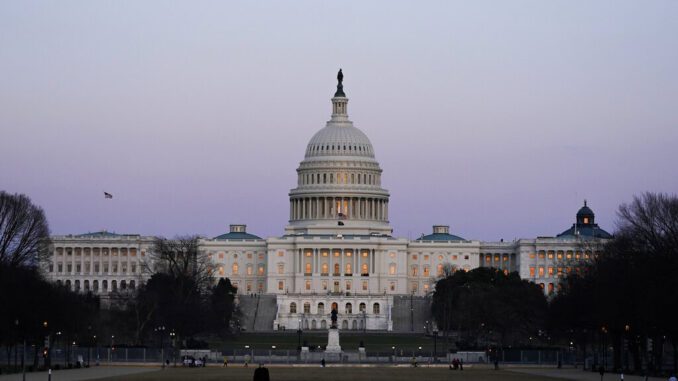
With $30 trillion of debt — which has grown by $5 trillion in just the last two years, with another $2 trillion of red ink expected to get spilled this year — you might have expected Congress at least to pretend it will temper its reckless spending proclivities.
But you would be sadly mistaken. Congress has just finalized a $1.5 trillion spending bill that required 2,741 pages of legislative text. The Heritage Foundation calculates it would take the average congressman over 300 hours to read this bill with all its legal gobbledygook. So, it’s a reasonable certainty that members of Congress have no idea what they voted for.
Republicans wanted more defense spending on top of the near $800 billion we already give each year to the Pentagon. The United States spends more on defense than China, Russia, India, Great Britain, Germany and Japan combined. But that isn’t evidently enough to protect our country, partly because the Biden Administration is spending tens of billions of dollars at the Pentagon on climate change and other green programs, which won’t protect us from any incoming missiles from our enemies.
Meanwhile, the Democrats wanted tens of billions more for domestic programs, including another $15 billion for COVID relief. That is on top of the $4 trillion already authorized since April 2020, with at least $100 billion still unspent. So, the deal that Republican and Democratic leadership struck was that both sides pretty much would get what they wanted. Taxpayers will be collectively stuck with another increase in their credit card bill that already has 13 zeros.
The House Republicans scored a rare victory (at least temporarily) when they blocked the $15 billion of funding House Speaker Nancy Pelosi was demanding for COVID, even though tens of billions of COVID money from previous bills haven’t been spent. Pelosi threatened to hold the $13 billion of emergency money for Ukraine hostage until she got the COVID money. When House Minority Leader Kevin McCarthy insisted that the COVID money be offset with savings elsewhere in our $6 trillion annual spending, the Democrats refused because they couldn’t find anywhere to cut. Pelosi called that outcome “heartbreaking.”
For whom is not clear.
The bottom line: There are no spending cuts. None.
But there are big, beefy increases in spending. In the Senate, Appropriations Committee Chairman Pat Leahy and the ranking Republican Richard Shelby, who have both served in Congress for it seems like a combined 100 years and are longtime Senate buddies (Politico reports their wives even hang out together), agreed to a bill that they boast contains a 7% raise, the “largest increase in four years.”
You’d think that the government was running a $2 trillion surplus, not a deficit that big.
The rumor on Capitol Hill is that many Senate Republicans went along with the deal because Shelby is retiring this year. If only the senators had passed a collection basket in the Senate cloakroom to give the retiring Alabama senator a gold watch; think of how much money would have been saved. Instead, taxpayers get bilked for tens of billions of additional spending, which undoubtedly makes this bill the most expensive going-away present in world history.
The bill is stuffed with pork, and no one seems embarrassed. Congress gave itself a 21% increase in office staff budgets. There is $600,000 for lobster pots for Maine fishermen, $2 million for a solar power “equity” program, $600,000 for a New York greenhouse, $4.2 million for a program related to sheep and $1.6 million for a program for Rhode Island shellfish.
At the end of the day, Pelosi and Senate Majority Leader Chuck Schumer were all smiles because the budget deal funds Biden’s “key domestic priorities.”
The White House gushed: “The bipartisan funding bill is proof that both parties can come together to deliver for the American people and advance critical national priorities.”
A small step for Washington and a giant leap toward national bankruptcy. Congratulations, Congress.
Stephen Moore is a senior fellow at Freedom Works. He is also author of the new book: “Govzilla: How The Relentless Growth of Government Is Devouring Our Economy.”



